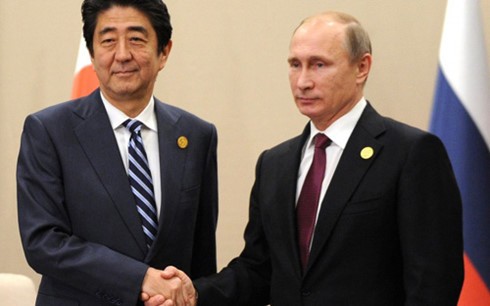(VOVworld)- The weekend’s unofficial visit to Russia by Japanese Prime Minister Shinzo Abe has caught the attention of international observers and the media. The visit is seen as satisfying both sides because Tokyo and Moscow both benefit from the strengthened ties.
 |
| Japanese Prime Minister Shinzo Abe (L) and Russian President Vladimir Putin (R) (Photo: nationalinterests) |
Since Russia is politically isolated and economically sanctioned by the West over the Ukraine issue, Prime Minister Abe was the first government leader of a G7 country to visit Moscow despite opposition from other members. Abe is the current President of G7. Russia considers this evidence of the West’s failed punitive policies, while forging closer ties with Japan to divide those who are putting pressure on Moscow.
After a meeting with the Russian President Vladimir Putin in Sochi, Prime Minister Abe appeared to be optimistic about settling territorial disputes and signing a peace treaty between the two countries. Comments from Russian politicians also showed Moscow’s satisfaction with Abe’s visit.
In fact, both sides have their own reasons to be pleased. Drawing closer to Moscow will help Tokyo achieve its goal of putting an end to territorial disputes left over from World War II and settling other issues such as the Syrian civil war. Bilaterally, Japan and Russia are important partners and Tokyo is becoming more important to Moscow. During talks with Prime Minister Abe, President Putin suggested strengthened bilateral cooperation in trade, finance and economics. Japan also mapped out a plan consisting of 8 areas of cooperation to revitalize the Russian economy, including projects for energy and industrial development in Russia’s Far East region.
The Japanese-Russian relations have been marred by the disputes over a group of islands known by the Japanese as its northern territory and by the Russians as South Kuril. However, both sides are aware that it’s high time to give priority to trade ties. While waiting for a viable solution to territorial disputes, Tokyo does not want to lag behind Beijing in dominating the Russian market. That’s why Abe’s visit brings about “new momentum” for the Japanese-Russian relations.
Russia is now making efforts to improve its diplomatic ties. Following Abe’s visit, Moscow will receive Italian Prime Minister Matteo Renzi in June when he will attend an annual investment forum in St. Petersburg.